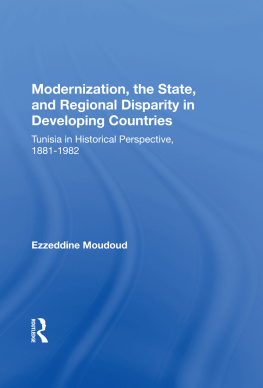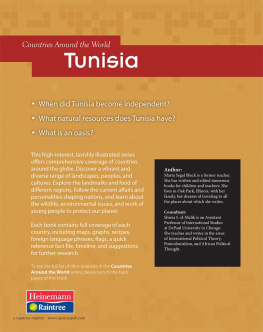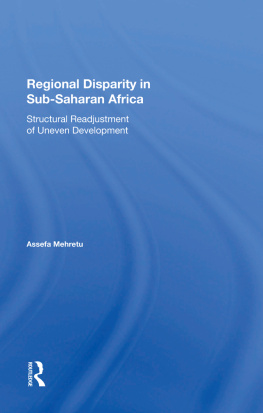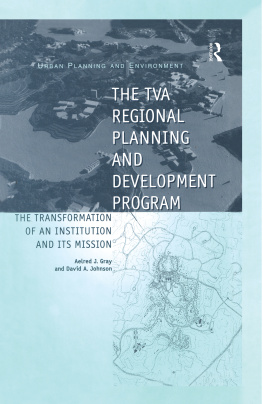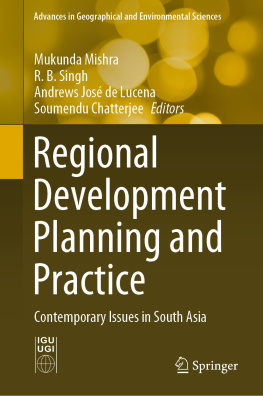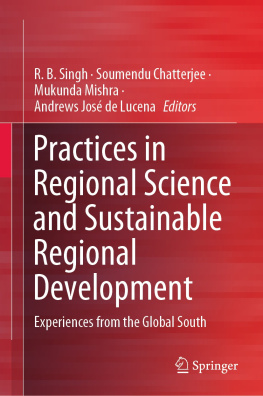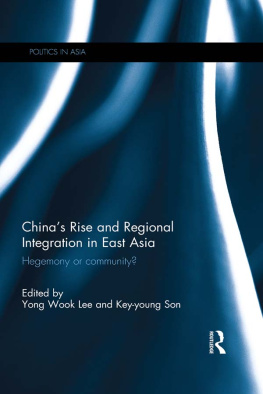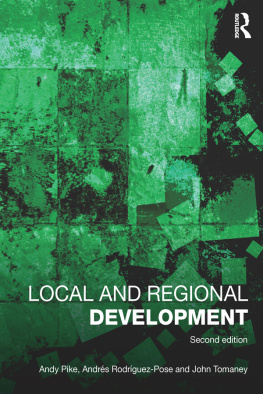Modernization, the State, and Regional Disparity in Developing Countries
First published 1989 by Westview Press
Published 2018 by Routledge
52 Vanderbilt Avenue, New York, NY 10017
2 Park Square, Milton Park, Abingdon, Oxon OX14 4RN
Routledge is an imprint of the Taylor & Francis Group, an informa business
Copyright 1989 by Taylor & Francis
All rights reserved. No part of this book may be reprinted or reproduced or utilised in any form or by any electronic, mechanical, or other means, now known or hereafter invented, including photocopying and recording, or in any information storage or retrieval system, without permission in writing from the publishers.
Notice:
Product or corporate names may be trademarks or registered trademarks, and are used only for identification and explanation without intent to infringe.
Library of Congress Cataloging-in-Publication Data
Moudoud, E. (Ezzeddine)
Modernization, the state, and regional disparity in developing
countries: Tunisia in historical perspective, 18811982 / by Ezzeddine Moudoud.
p. cm.(Westview special studies on Africa)
Bibliography: p.
Includes index.
ISBN 0-8133-7709-9
1. TunisiaEconomic conditions1956 Regional disparities.
2. TunisiaDependency on foreign countries. 3. Economic
development. I. Title. II. Series.
HC820.M68 1989
338.9611dc19
88-38119
CIP
ISBN 13: 978-0-367-01295-3 (hbk)
la mmoire de mon pre
ma mre
pour Chantal, Fadhel et Fathi
Contents
, Dennis A. Rondinelli
PART ONE
DEVELOPMENT, UNDERDEVELOPMENT AND THE TRANSITIONS DILEMMAS
PART TWO
REGIONAL DISPARITY AND THE QUESTION OF TRANSITION IN TUNISIA
PART THREE
TOWARDS RETHINKING THE REGIONAL QUESTION
Guide
Achieving some degree of equity in economic growth and social progress among territorial regions has been a goal of governments in less developed countries since the late 1950s. Many governments have divided their nations into territorial administrative regions in order to focus development activities on the diverse needs of people living in different parts of the country. Many have created regional planning or development agencies to carry out development plans. But few governments in the developing world have succeeded in reducing the disparities among regions or in stimulating development in economically lagging areas.
The infrequency of their success, however, has neither discouraged Third World governments from pursuing regional development nor undermined the rationale for regional planning. Indeed, regional planning and development remain an integral part of development strategies in nearly all Third World countries. The reasons are not difficult to discern. Sub-national regions can provide convenient units of analysis for disaggregating national development goals and objectives, and for devising policies and programs that can attain more balanced and widespread economic growth. Regional planning can help national and local government agencies to tailor their development policies to the diverse needs of people living in different parts of a country. Regional planning can also provide greater opportunities for local groups who will be affected by development programs to participate in their identification, design, and implementation.
Regional planning also allows governments to test innovative economic and social programs that are appropriate for one area without having to justify them for the whole country. Regions provide convenient geographical units for coordinating the investments of a variety of central ministries in the services, facilities and infrastructure needed to stimulate economic development and meet basic human needs. Finally, regional planning can guide the spatial allocation and location of development investments that influence population distribution and the pattern of human settlement.
Given these advantages of regional planning, why have so few governments in developing countries been successful in implementing their development plans? Why have so few sustainable benefits accrued to people living in economically lagging regions?
Ezzeddine Moudous analysis of regional policy in Tunisia begins to answer these questions. His book provides an historical context for understanding why regional disparities emerged in Tunisia and why reducing those disparities has been so difficult. Moudoud shows that the disparities between the littoral and the interior regions of Tunisia cannot be attributed to natural or accidental causes. They were the result of deliberate policies during the colonial period that favored the littoral zones and that drained resources from the interior. Post-colonial economic policies in Tunisia reinforced the pattern of development that enriched the ruling elite and its political supporters and that consolidated the power of the State.
Regional development does not occur simply because governments make plans for their growth. Development requires the investment of economic resources in productive activities, the enhancement of human resources, the creation of incentives that motivate people to work toward development goals, and the empowerment of local communities to identify their objectives and mobilize resources for their attainment. Resources must be invested in specific communities with growth potential, guided by a spatial strategy that takes into consideration the distribution of population and the comparative advantages of settlements. In countries where policies have favored the development of some regions over others, development in the lagging regions usually depends on State policies that ensure some degree of redistribution.
Moudoud implies that the failure of regional development in Tunisia does not lie in the concept of regional planning. His analysis concludes quite clearly that although the central government made regional plans, regional development was never seriously tried in Tunisia. The actions needed to bring about a more equitable pattern of economic development never received serious political support. In what Moudoud calls the Jacobin tradition, the central government attempted to impose technocratic solutions from above. It had no spatial strategy for developing the interior. It had little interest in reforms needed to redistribute economic resources between the littoral and interior areas. Most important, the government failed to enact or implement policies that would redistribute political power between the State and the regions.
In this study of Tunisias experience with regional planning, Moudoud sheds light on the dilemma inherent in the regional question in many other Third World countries. Underlying the inefficacy of regional planning is the lack of political commitment to reallocating economic resources and political power in ways that will enable local communities to fashion their own economic and social destinies.
These tensions between the State and the regions are ironic: history suggests that few political regimes have sustained their power under conditions of severe economic disparity, yet few regimes are willing to redistribute the economic and political resources needed to promote widespread economic growth and social progress. It is this dilemma that Moudoud explores in his study of Tunisia. It is this dilemma that must be resolved before the efficacy of regional planning and development can be tested fairly in the Third World.

